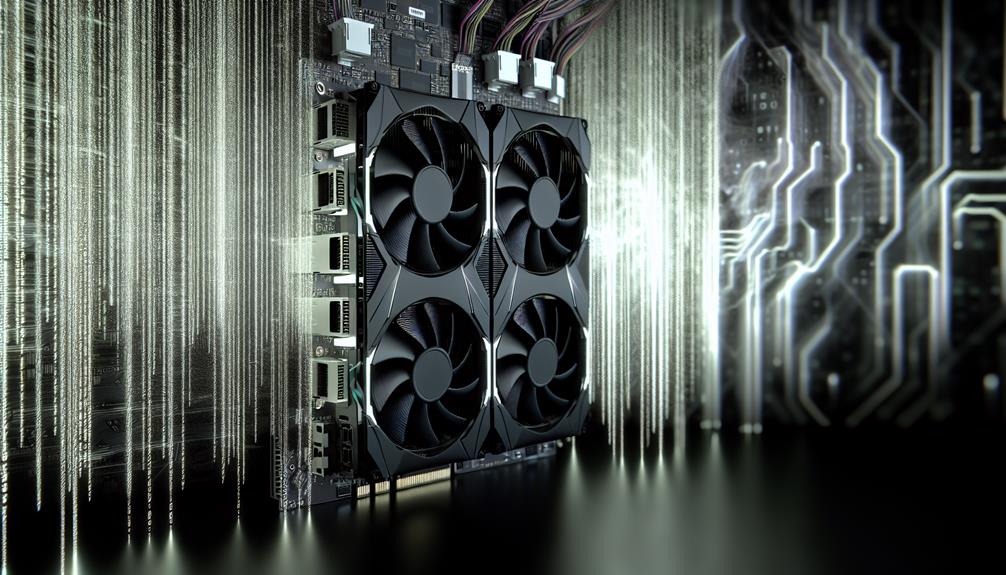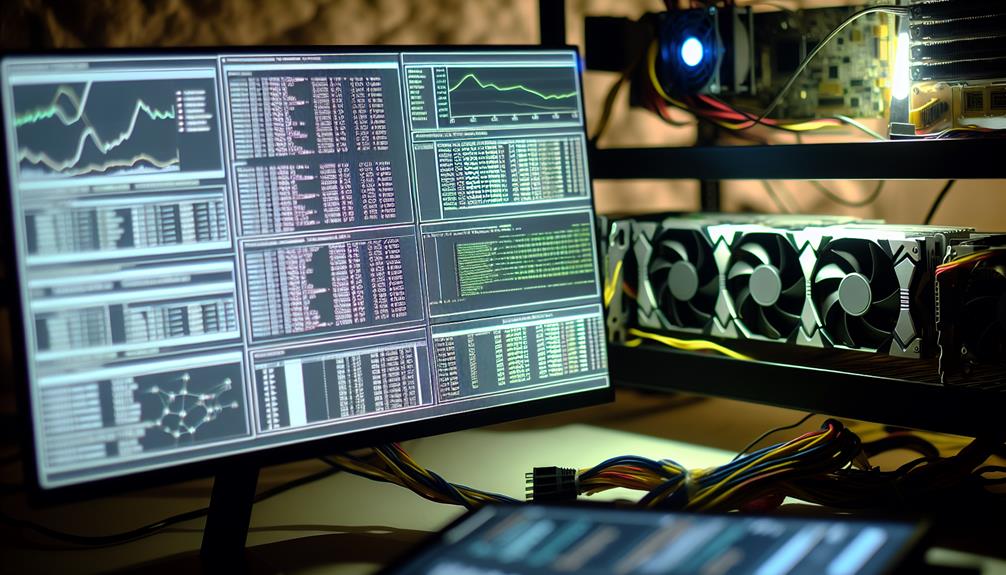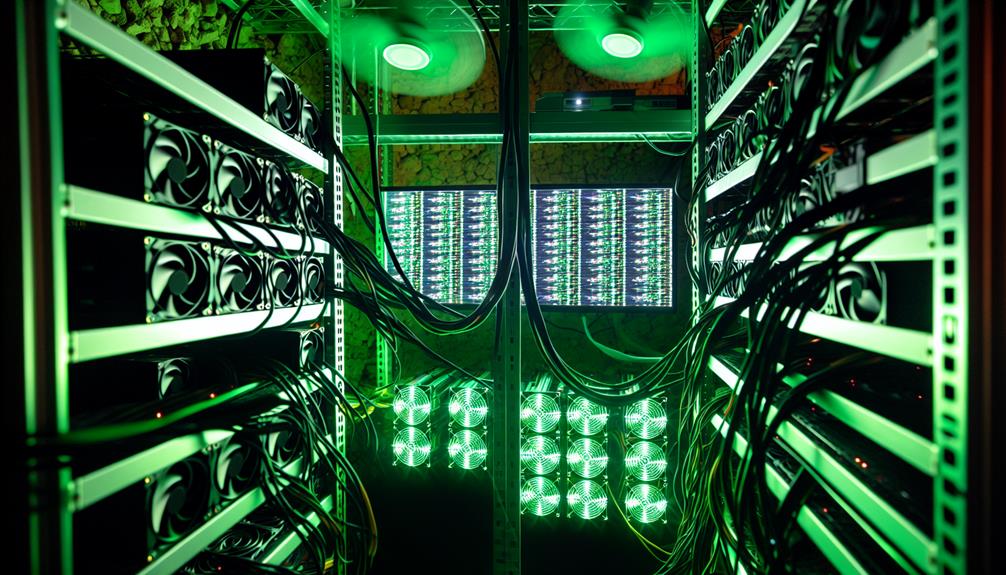Mining Bitcoin can feel like a high-stakes game of chance, yet it's rooted in technical precision and strategy. You might wonder where to start, especially when the landscape is constantly evolving. Understanding the essential hardware and software requirements is vital, but there's more to take into account than just the tools at your disposal. As you explore the various methods and tips for successful mining, you'll find that your decisions can greatly impact your profitability. So, what are the key factors you should keep in mind to guarantee a successful venture?
Understanding Bitcoin Mining

Bitcoin mining is an essential component of the blockchain ecosystem, serving both to validate transactions and to secure the network. As you explore the world of Bitcoin mining, it's vital to understand how it operates within blockchain technology. Each transaction is bundled into a block, and miners use computational power to solve complex cryptographic puzzles. This process not only confirms the legitimacy of transactions but also adds the block to the existing chain, enhancing the network's security.
When considering mining profitability, you'll need to evaluate several factors. The first is the current Bitcoin price; higher prices generally mean greater potential profits. Next, consider the mining difficulty, which adjusts approximately every two weeks based on the network's total hashing power. If more miners join, the difficulty increases, making it harder for you to earn rewards.
Electricity costs play a notable role in determining your profitability as well. Miners require substantial energy to operate their hardware continuously, and depending on where you live, this could greatly eat into your profits. You'll also want to take into account the initial investment in mining equipment, as well as ongoing maintenance costs.
To maximize your mining profitability, it's advisable to stay informed about market trends and technological advancements. By understanding the intricacies of Bitcoin mining and how blockchain technology underpins it, you'll be better positioned to make informed decisions in this rapidly evolving landscape.
Essential Hardware Requirements
When diving into the world of Bitcoin mining, selecting the right hardware is crucial for maximizing efficiency and profitability. The primary choice you'll face is between ASIC miners and traditional GPUs. ASIC (Application-Specific Integrated Circuit) miners are designed solely for Bitcoin mining and offer unparalleled processing power. They're often more efficient than GPUs, but they come at a higher upfront cost.
Next, consider the power consumption of your mining equipment. ASIC miners generally consume a significant amount of electricity, which can lead to high operational costs. You need to calculate the energy efficiency, or how much hashing power you get per watt. Look for miners that provide a high hash rate with low power consumption to guarantee your operation remains profitable.
In addition to the mining hardware, you'll also need a reliable power supply unit (PSU) that can handle the energy demands of your chosen equipment. Don't skimp on quality here, as a subpar PSU can lead to system failures or inefficiencies.
Lastly, cooling solutions are another crucial aspect. Mining generates a lot of heat, and maintaining ideal temperatures is essential for the longevity and performance of your hardware. Consider investing in dedicated cooling systems or fans to manage the heat effectively. To conclude, selecting energy-efficient mining equipment with low power consumption and implementing adequate cooling will set a solid foundation for your Bitcoin mining venture.
Software Options for Mining

Once you've selected the right hardware for your mining operation, the next step is choosing the appropriate software. The software you select is essential as it directly impacts your mining efficiency and profitability. Here are three key factors when evaluating mining software:
- Compatibility: Confirm the software is compatible with your hardware and operating system. Most mining software supports Windows, macOS, and Linux, but double-checking is vital.
- Mining Pools: If you're planning to join a mining pool, verify that your chosen software supports it. Mining pools allow miners to combine their computational power, improving their chances of earning Bitcoin. Look for software that has built-in features for easy pool integration.
- User Interface: A user-friendly interface can greatly enhance your mining experience. Opt for software that's easy to navigate, especially if you're a beginner. Some programs offer advanced analytics, which can be beneficial for monitoring your performance.
In addition to these factors, you'll also want to take into account the software's stability and community support. Popular mining software options include CGMiner, BFGMiner, and EasyMiner, each with unique features tailored to different user needs. By selecting the right mining software, you can streamline your operations and maximize your potential returns. Remember, the effectiveness of your mining setup is often determined by the synergy between your hardware and software choices.
Different Mining Methods
Mining Bitcoin involves various methods, each with its own set of advantages and challenges. One popular approach is pool mining, where individual miners join forces to increase their chances of earning rewards. In this method, you contribute your hashing power to a collective pool and receive a share of the rewards based on your contribution. Pool mining can be more efficient and less risky for beginners, as it provides a steadier income stream compared to solo mining, which can be highly uncertain and dependent on luck.
On the other hand, cloud mining offers a different experience altogether. Instead of investing in hardware and managing the mining process yourself, you can rent hashing power from a cloud mining provider. This method eliminates the need for physical equipment, electricity costs, and cooling solutions, making it appealing for those who want to enter the Bitcoin mining space without the technical complexities. However, cloud mining comes with its own risks, such as potential scams and less control over your mining operations.
Both pool mining and cloud mining have their merits and drawbacks. While pool mining provides a collaborative environment with more predictable returns, cloud mining offers convenience and reduced hassle. Ultimately, the choice between these methods depends on your resources, risk tolerance, and long-term goals in the Bitcoin ecosystem. Understanding these distinct approaches will help you make an informed decision as you initiate your mining journey.
Tips for Successful Mining

Optimizing your Bitcoin mining efforts requires a strategic approach that encompasses hardware selection, energy efficiency, and ongoing maintenance. To enhance your mining profitability, consider the following tips:
- Select the Right Hardware: Invest in high-performance ASIC miners that are known for their hash rate efficiency. Look for models that offer the best balance between cost and output, as this can greatly impact your overall profitability.
- Improve Energy Efficiency: Since energy costs can eat into your profits, focus on reducing power consumption. Choose miners with lower wattage per hash and consider renewable energy sources, such as solar or wind, to minimize electricity expenses.
- Monitor and Maintain Your Equipment: Regularly check the performance of your mining rigs. Keep them clean and guarantee proper cooling to avoid overheating. Implementing a monitoring system can help you track efficiency and identify issues before they escalate.
Frequently Asked Questions
What Is the Environmental Impact of Bitcoin Mining?
The environmental impact of Bitcoin mining's significant due to energy consumption. However, if you focus on sustainable mining practices and utilize renewable energy sources, you can mitigate negative effects and promote a greener cryptocurrency ecosystem.
Can I Mine Bitcoin on My Smartphone?
Your smartphone's like a candle in a storm—limited and fragile. It can't handle mining's intense demands. With smartphone limitations, mining profitability drops considerably, making it impractical compared to dedicated hardware. Consider alternatives for effective mining.
How Much Electricity Does Bitcoin Mining Consume?
Bitcoin mining consumes significant electricity, impacting mining profitability. You'll need to take into account energy efficiency when evaluating your setup, as higher efficiency can reduce costs and enhance overall returns in this competitive landscape of cryptocurrency mining.
Is Bitcoin Mining Legal in All Countries?
While bitcoin mining's allure is undeniable, it's essential to know that regulations vary. Not every country embraces it, so you'll want to research global mining legality to avoid potential legal pitfalls in your area.
What Happens to Mined Bitcoins if I Lose My Wallet?
If you lose access to your wallet, mined bitcoins are effectively irretrievable unless you have wallet recovery options. Without backup phrases or keys, those assets remain locked away indefinitely, emphasizing the importance of secure storage practices.
Conclusion
As you commence your Bitcoin mining journey, the stakes are high and the rewards tantalizingly close. Picture those gleaming ASIC miners, tirelessly working in tandem with your chosen pool, each hash bringing you one step nearer to your goal. But beware—the market's volatility looms like a shadow. Stay alert, adapt your strategies, and manage your resources wisely. The thrill of the chase is just beginning, and the potential for profit hangs in the balance, waiting for you to seize it.
